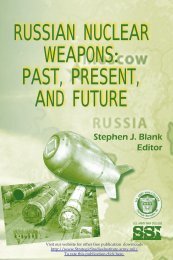The United States and China in Power Transition - Strategic Studies ...
The United States and China in Power Transition - Strategic Studies ...
The United States and China in Power Transition - Strategic Studies ...
Create successful ePaper yourself
Turn your PDF publications into a flip-book with our unique Google optimized e-Paper software.
were confident <strong>and</strong> eager to unleash their production<br />
power to turn <strong>Ch<strong>in</strong>a</strong> around.<br />
Organski, while work<strong>in</strong>g on his power transition<br />
theory, took note of the Ch<strong>in</strong>ese upward movement<br />
<strong>and</strong> believed that <strong>Ch<strong>in</strong>a</strong> had entered the stage of transitional<br />
growth. He also noted that some <strong>in</strong> the West<br />
already suggested that the world make room for this<br />
awakened <strong>and</strong> soon-to-exp<strong>and</strong> <strong>Ch<strong>in</strong>a</strong>. 25 However, the<br />
Ch<strong>in</strong>ese move soon turned out to be a misguided false<br />
start. Once aga<strong>in</strong>, the Ch<strong>in</strong>ese leaders had taken some<br />
very questionable measures. In almost 3 decades, <strong>in</strong>stead<br />
of mak<strong>in</strong>g <strong>Ch<strong>in</strong>a</strong> great, they brought this nation<br />
to ru<strong>in</strong>s.<br />
<strong>The</strong> most questionable measure was still about<br />
government. Like its Q<strong>in</strong>g predecessors, the CCP rejected<br />
the Western democratic way of government.<br />
Yet for bl<strong>in</strong>d-m<strong>in</strong>ded ideology as well as ill-advised<br />
practical reasons, it chose to replicate the Soviet dictatorship<br />
<strong>in</strong> <strong>Ch<strong>in</strong>a</strong>. 26 In so do<strong>in</strong>g, the CCP created a<br />
“modern” government that ironically reta<strong>in</strong>ed the<br />
fundamental flaws of past Ch<strong>in</strong>ese governments—it<br />
was a government ruled by man but not by law, without<br />
checks <strong>and</strong> balances, <strong>and</strong> good on political repression.<br />
Thus although the CCP claimed to have broken<br />
from <strong>Ch<strong>in</strong>a</strong>’s dynastic tradition, this political system<br />
would soon make it a rul<strong>in</strong>g party no different from<br />
those of the past <strong>and</strong> was also largely responsible for<br />
its paramount leader Mao Zedong’s abuse of power<br />
<strong>and</strong> much of the catastrophic destruction he brought<br />
to <strong>Ch<strong>in</strong>a</strong> dur<strong>in</strong>g his reign.<br />
Mao might be a great revolutionary <strong>and</strong> war fighter;<br />
but he was no good on economic development. He<br />
used political rather than economic approaches to run<br />
the nation. In 1957, Mao launched the first of his many<br />
political movements <strong>in</strong> the PRC. It was the senseless<br />
“Anti-Rightists Movement (反右运动)” <strong>in</strong> which over<br />
42

















